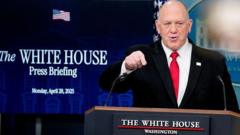In a notable change, the Trump administration is proposing to recognize Crimea as part of Russia in an effort to facilitate peace between Russia and Ukraine, reversing more than ten years of U.S. foreign policy.
Trump Shifts U.S. Stance on Crimea in New Peace Proposal

Trump Shifts U.S. Stance on Crimea in New Peace Proposal
A controversial peace plan put forward by the Trump administration acknowledges Crimea as part of Russia, marking a significant shift in U.S. policy.
Article Text:
In a surprising turn of events, former President Donald Trump, during a communication from London, has submitted a new peace proposal aimed at resolving the ongoing conflict between Ukraine and Russia. This plan includes a striking provision that would recognize Crimea as a part of Russia, an acknowledgment of Moscow's controversial annexation of the peninsula that occurred in 2014.
Historically, this issue has been a contentious point in U.S.-Ukraine relations. During Trump’s first term, Ukraine officials expressed concerns that he might lean towards legitimizing Russia’s claims over Crimea. Trump, while campaigning, hinted he would consider the situation, suggesting that many Crimeans might prefer to align with Russia, contrary to the stance taken by the Obama administration and Western allies, who condemned the annexation outright.
Despite earlier assurances, including a firm declaration from Secretary of State Mike Pompeo in 2018 emphasizing nonrecognition of Crimea until Ukraine’s sovereignty was restored, Trump's latest proposal threatens to overturn this long-established U.S. stance. Diplomats have criticized the proposal, with Daniel Fried, a former U.S. diplomat, labeling it the most troubling aspect of the initiative and highlighting its perceived advantage for Moscow in the negotiations.
The implications of this shift are substantial and could reshape the geopolitical landscape in Eastern Europe, with significant repercussions for Ukraine's territorial integrity and international relations moving forward.
In a surprising turn of events, former President Donald Trump, during a communication from London, has submitted a new peace proposal aimed at resolving the ongoing conflict between Ukraine and Russia. This plan includes a striking provision that would recognize Crimea as a part of Russia, an acknowledgment of Moscow's controversial annexation of the peninsula that occurred in 2014.
Historically, this issue has been a contentious point in U.S.-Ukraine relations. During Trump’s first term, Ukraine officials expressed concerns that he might lean towards legitimizing Russia’s claims over Crimea. Trump, while campaigning, hinted he would consider the situation, suggesting that many Crimeans might prefer to align with Russia, contrary to the stance taken by the Obama administration and Western allies, who condemned the annexation outright.
Despite earlier assurances, including a firm declaration from Secretary of State Mike Pompeo in 2018 emphasizing nonrecognition of Crimea until Ukraine’s sovereignty was restored, Trump's latest proposal threatens to overturn this long-established U.S. stance. Diplomats have criticized the proposal, with Daniel Fried, a former U.S. diplomat, labeling it the most troubling aspect of the initiative and highlighting its perceived advantage for Moscow in the negotiations.
The implications of this shift are substantial and could reshape the geopolitical landscape in Eastern Europe, with significant repercussions for Ukraine's territorial integrity and international relations moving forward.























